He moved to the Eastern Hockey League's New York-Hamilton Crescents, posting 19 points in 21 games in 1934-35, earning First Team All-Star honors. The Philadelphia Ramblers of the Can-Am Hockey League was his next stop in 1935-36. He accumulated 86 penalty minutes in 48 games while scoring 15 points and again earning league First Team All-Star recognition.. His strong defensive play in Philadelphia captured the attention of the New York Rangers of the NHL, who gave Cooper a one game tryout that season, which earned him a contract for the 1936-37 season.
Cooper would spend the entire season with the Rangers, where he would play in all 48 games of the Rangers schedule, scoring his first NHL points with 3 assists. New York would make it to the Stanley Cup final that season as Cooper added a goal and an assist in 9 playoff games.
He would score his first NHL regular season goal the next season of 1937-38 on his way to a total of 3 in 46 games, but offense was not the reason Cooper was in the NHL. At 6' 1" and 200 pounds he was one of the largest players of his day and his strength made him one of the toughest players in the league for opposing forwards to contend with.
The Rangers traded Cooper to the Chicago Black Hawks for the 1938-39 season. He would play 17 games for Chicago, scoring 3 goals and 6 points, but spent the majority of the season back with the Philadelphia Ramblers, who were now in the International American Hockey League, where he scored 8 goals and 23 points in 35 games.
Cooper re-established himself as an NHL regular in 1939-40 and only missed 12 games for Chicago over the course of the next three seasons, highlighted by his first 20 point season in 1941-42.
World War II interrupted his career in 1942, but he found time to play 12 games with the Ottawa Commandoes of the Quebec Senior Hockey League. The Commandos advanced to the Allan Cup final against the Victoria Army team from British Columbia, who they defeated 3 games to 1 to claim the senior championship.
For the 1943-44 season, Cooper played 10 games with Ottawa before returning to the NHL with Chicago for 13 regular season games and 9 playoff contests as the Black Hawks advance to the Stanley Cup final.
Cooper had the finest offensive season of his NHL career in 1944-45 when he had 4 goals and 17 assists for 21 points in 50 games. Before the following season began, he was claimed off waivers by the Boston Bruins, but before he could suit up, he was sold back to Chicago, where he would play his seventh and final season with the Black Hawks.
Chicago then sold Cooper back to the Rangers for the 1946-47 season. Back in Manhattan, he scored 10 points in 59 games in what would turn out to be his final NHL season. Cooper would play 24 games with the Cleveland Barons followed by 29 games for the Hershey Bears, both of the AHL, to conclude his hockey career.
HIs final NHL totals were 420 games played with 30 goals and 66 assists for 96 points and 442 penalty minutes. Cooper is an Honored Member of the Manitoba Hockey Hall of Fame.
Today's featured jersey is a 1946-47 New York Rangers Joe Cooper jersey. This rare and unusual jersey was only worn by the Rangers for a single season, the only time from their inception in 1926-27 through 1975-76 that the club would not wear their customary diagonal Rangers crest.
In 1976-77 the Rangers changed to a modernized set of jerseys which featured the Rangers shield logo as the main crest for two seasons before changing back to their diagonally lettered jerseys, which they continue to use to this day, making today's featured jersey one of only three seasons in Rangers history they did not have diagonally lettered jerseys.
Cooper, #12, is seen below in the rare one season only Rangers 1946-47 jersey with teammate #11 Bryan Hextall, who was father of Bryan Hextall Jr. and Dennis Hextall and grandfather of goaltender Ron Hextall.

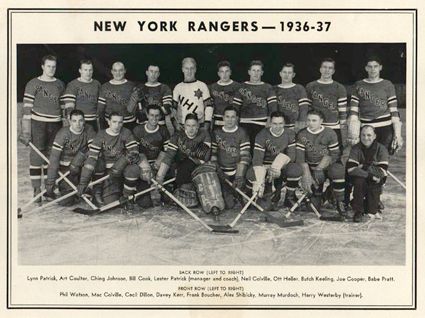
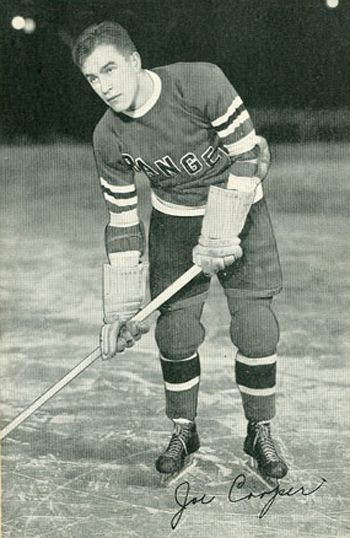
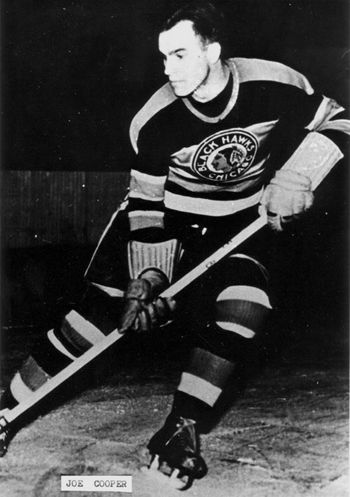
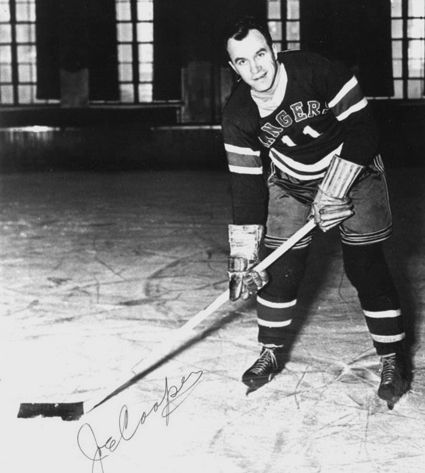
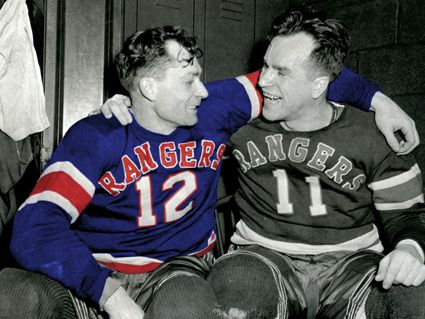










No comments:
Post a Comment
We welcome and encourage genuine comments and corrections from our readers. Please no spam. It will not be approved and never seen.